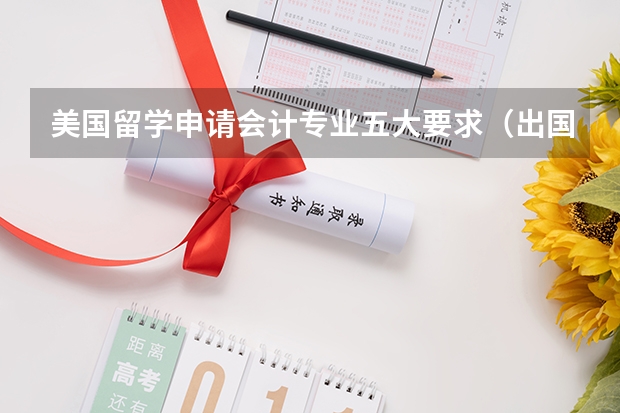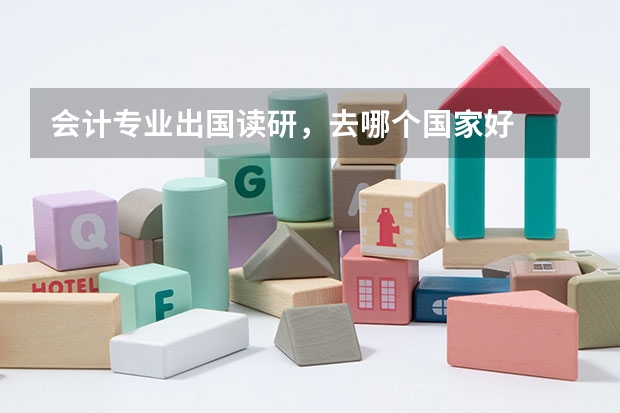美国留学申请会计专业五大要求(出国留学个人陈述主要叙述学习动机和专业背景)
2024-02-29 04:45:57 | 瑞金盛留学网
本文目录一览:

美国留学申请会计专业五大要求
我为大家介绍美国留学申请会计专业五大要求,希望对出国留学的同学有所帮助。想了解更多留学精彩内容,为你详细解答。
📝申请文书
申请者的简历,个人陈述和小论文都很重要。首先,英文要好,句子要NATIVE,避免中国式英文。其次,办理美国mba对专业和学校要有较好的了解。再次,要结合自身实际情况,展现自身特色。
📞电话面试
当你得到面试通知的时候,应该比较高兴了,因为这就说明我们的申请已经成功一半了,电话面试来主要是考查学生是否可以获取奖学金。面试的基本内容是要了解学生对本专业现有研究与发展前景的认识,以及讲讲你自己是如何如何,多么多么适应这个学校,这个专业的。
🎓专业背景
如果你没有专业背景,就要考虑补课了,也就是先上个non-degree的,再把学分转过去,只要你努力,是可以申请上会计的。如果你本科是会计专业并且有相关的经验,Gmat又足够高的话,那么前50学校的大门门槛对你来说就相对低了许多啊。
🇺🇸英语水平
首先,对于绝大多数学校来说,Gmat是必须的,而且分数是多多益善啊。要是希望冲击前50的学校,至少也要680,而且同时要具备相关专业背景甚至工作经验。要是你的分数更高,那么你就可以考虑顶级的学校了。650分则保险起见,先申请一个100后的学校。最低也不能低于600了,否则就很难申请到了。
💼工作经验
工作经验并非必须,但是美国大学会计专业有相关工作经验对于很多学校来说,也能帮你多加一个筹码。

出国留学个人陈述主要叙述学习动机和专业背景
个人陈述是留学申请材料中唯一反映学生学习动机、专业背景和个人素质的材料,也是美国学校录取委员会重点考察的内容。出色的个人陈述是把自己的个人背景和留学动机结合得恰到好处。 个人陈述主要叙述学生的学习动机和专业背景。一份好的个人陈述至少要包含以下两个主题:一是要反映学生对未来学习计划、职业规划进行的科学、合理分析和思考;二是要反映学生对自己的专业经验、个人素质的合理评价。下列几个问题不能回避:为什么要读研究生?为什么选这个专业?为什么选这个学校?具体要读什么?读完之后要做什么?学生说明自己和别人相比的过人之处时,要突出专业水平及抱负,有的放矢,不要把笔墨浪费在不相关的叙述上。学生要找一个与众不同的视角来展现自己,这样才能在众多申请文件中脱颖而出。判断一篇个人陈述是否符合基本标准,首先要看文章是否能回答两个问题:一是学生感兴趣的领域是什么?二是学生为什么要花这么长时间和这么多费用去读该领域的研究生?不少学生在个人陈述写满整整一页后还没有提及自己到底想做什么。美国学校的录取决定权主要在教授手中。如果学生不能开门见山提出感兴趣的领域,录取委员会可能不会立刻指定一个和申请人领域相近的教授审查其材料。申请就可能被搁置很长一段时间,甚至失败。
在竞争激烈的申请中,申请材料要从没有决定权的助理或秘书手中准确、迅速地转到适合自己的教授手中,学生就要有明确的申请方向,并在个人陈述和简历中明确提出。
一篇出色的个人陈述还要有独特性。个人陈述不仅是谈自己的动机和专业背景,还要谈自己的独特之处,包括自己的个性和价值观。一个人是否能成功,不仅由学习能力决定,还要看其能否平衡学习和生活、自主和团队合作的关系。优秀的个人陈述还要有较好的英语表达。学生对英语要有较好的掌握程度和逻辑能力。
平时很少主动、思考的学生要提前改变自己,去思考过去和未来,认识自己留学的真正目的,然后真实、有效地表达出来。2至3页的个人陈述就是学生向教授展示这些思考的最好机会。

2018年美国留学个人陈述范文
很多学生会选择去美国留学,那么美国留学的个人陈述范文是如何呢?和一起来看看吧!下面是我整理的相关资讯,欢迎阅读。
美国留学个人陈述范文
范文1
In China as in the US, one can easily give up the career of a language teacher to become a lawyer or a businessman. I, however, gave up a promising legal and business career to become a language teacher, but I have never regretted it. In fact, the more I teach, the more committed I am to teaching. But not just teaching. Having battled with China’s traditional mode of teaching for several years, I now would like to help improve teaching in China by introducing new and more effective instructional technology and media into the country. For that, I would like to pursue an advanced degree in education in your country.
Now an English teacher at the training center of the China National Container Corporation, I graduated in 1995 from the Capital University of Economics and Business in Beijing, where I majored in business law. At this highly respected higher-learning institution, I received broad training that was both rigorous and vigorous. After four years of undergraduate studies, the strong logic inherent in law translated into strong logic in my thinking. With the knowledge and skills I attained in the law program, I boast the kind of intellectual maturity that would help me whatever I do. But law was never my first choice for a profession.
Starting from my high school days, I always dreamed of becoming a teacher. In the second year of high school, we once had to write an essay on the topic “what do you want to do when you grow up”. I proudly wrote, “I want to be a teacher!” But my parents shattered my dream by insisting that I pursue another profession. My father, an engineer with a Ph. D. degree, and my mother, a university teacher of English, had their reasons. Chinese teachers, particularly those teaching at the primary and secondary levels, are poorly paid and begrudgingly respected. Being young and inexperienced in the world, I acceded to their wishes when I was choosing my major for the university.
But my passion for teaching was not to be stifled forever. Giver any opportunity, it would burst out. Upon graduation with an LL. B. Degree, I first took up the position of a supervisor with the China National Container Corporation in charge of its Overseas Sales Department. As the job entailed frequent translation and interpretation between Chinese and English, I persisted in improving my English proficiency by attending various training courses and learning it on my own. My command of the foreign tongue became so good that, after about one year, I began to teach it to my colleagues on a full-time basis at the company’s training center. After a huge detour, my career finally got back on track.
What makes teaching so enjoyable to me is that it is a learning experience. I enjoy it the most when my students ask difficult questions, particularly questions that I have to think long and hard to answer. I also enjoy posing questions to students, but my questions are never intended to intimidate the students or even test their knowledge but rather designed to stimulate their minds. In the constant exchange of questions and answers, students and teachers improve themselves alike to the credit of the old Chinese saying: To teach is to learn. In my three years of teaching, I really have learned a great deal.
One of the things I have learned is the ability to not only deal with but also strike an accord with people of different backgrounds. My students at the training center are all adults accomplished in a variety of roles and professions. In most cases, they are older than I am. While I stand as their equals, I have served as their mentors and role models the same way as most teachers do their students. By so doing, I have won their trust and confidence in what I teach, which has helped to make my teaching powerful and effective.
To take full advantage of my teaching skills, I started in October 1996 to teach English and other subjects at the primary school I attended when I was a child. As the children I teach are at the age when I studied here, I am particularly sensitive to their needs and appreciative of their potential. Together with other teachers, I designed various training programs in calligraphy, art, writing, mental calculation, and English, programs that combine learning with entertainment. The kids n my class are now learning more and faster thanks to the fun they find everyday in my programs.
Entertainment is, however, by no means just a ploy I use to sweeten the bitter pill of learning for the children, but rather has its own intrinsic value. While kids can hardly learn well without being able to have fun, the lack of fun hurts more than the kids’ ability to learn. It can impair the kids’ emotional and psychological health to an extent that no amount of knowledge and skills drab teaching force-feeds into them can make up. Entertainment is therefore part and parcel of what we teachers have to provide to children if we are to help them grow up into productive members of the society. The way I see entertainment, it should be considered an end in education.
As China’s education is oriented overwhelmingly towards helping kids pass exams, entertainment is about the least on the mind of an average teacher or principal. In the rush to produce super kids as measured by the grades out of exams, the purpose of education is lost all too often. The curriculum is limited to subjects covered by mandatory exams. Students are seldom encouraged to come up with original ideas. Interaction between teachers and students is kept at a minimum in the classroom. The teachers compete to heap homework on the students, as do the parents. While everybody is tired to death, few kids get armed with the ability to take initiatives or solve real-world problems. It is high time that fresh approaches were brought in.
One of the ways to make a change to the Chinese classroom is to utilize new technologies and media of teaching. School authorities in China, as those elsewhere, increasingly realize the importance of computerization, and many of the better-off schools in China are already stacked with state-of-the-art computers. But reports say only a tiny fraction of those computers are adequately utilized. The situation with other educational technologies and media is no better. They are either absent from the school sitting or vastly under-used. Few Chinese teachers have acquired the know-how or the drive to make use of these modern facilities.
I therefore would like to pursue first a master’s degree and then a Ph. D. degree in instructional technology and media in the United States, where the use of modern educational facilities is undoubtedly the most advanced in the world. Judging by the information I have culled from your, website I think your institution is an American leader in the research and studies of this field. I am anxious to study under the seasoned guidance of your distinguished faculty. I hope that, after I complete my advanced training in your program, I can be a much more effective teacher in China, one that sets an example for all other Chinese teachers.
范文2
The most important element of my classroom, my office, or my home is a personal relationship. I have figured this out on examination of my activities in high school (youth group regional president), college (telephone crisis counselor, resident advisor), or profession (teacher). As a teacher I made a point of getting to know every student in my classes personally. It quickly became my experience that students were more willing to learn, work, and excel when they were appreciated as individuals and when they knew that the adult in the classroom genuinely liked them.
After a few years' experience teaching seniors, I accepted a teaching job at the middle school with the freshman class that had just learned they would not physically be moving to the high school. How would I motivate and get to know these kids? Everything that I had ever heard about or remembered about 9th grade made me want to turn and run. But what convinced me to take this job was technology. In my interview I learned that instead of the library, I was to use the Internet (the what?). I was told that I would receive a laptop computer (aren't those the things that people with "real" jobs used?) and that the kids could teach me anything I needed to know.
Computers became my thing. Immediately I began to learn how to surf the Internet from 8th and 9th graders (Sanj and Judy said I was teachers' pet). My kids opened up and set aside their raging adolescence to use technology to help me and help each other. As the year with the freshmen continued, I was overjoyed. First, my kids and I had the best rapport in years (gosh Miss Glazer, are all of your PowerPoint slides gonna look the same?). Second, my creativity in teaching increased as new doors were opened to me and in turn to my students (conspiracy takes on a whole new meaning when the Internet is your primary source). Third, I was learning new and exciting things. I had finally found a combination of skills that affected my students in such a positive way that I knew I had to share my findings. 瑞金盛留学网
I have since taken my computer knowledge, instructional design ideas, plus my emphasis on personal relationships and applied it to teachers and students in my district and other districts in the North Texas area.
Through the Learning, Design, and Technology program at Stanford University I hope to continue on the route that started for me at the middle school. I know that I will learn new things and have an opportunity to apply them to educational settings. I also know that I will be able to establish relationships with colleagues, professors, and other students. Although a master's degree is the short term goal, I believe that my long term goal remains the same as when I began using technology in my classroom three years ago: to see students better educated through a curriculum infused with technology by teachers who do not lose sight of the personal relationships that benefit all kids.
This long-term goal may be achieved by working in a single school, a school district, or an educational center. It may be reached by teaching new teachers on the university level, by instructing at-risk students in a county after-school program, or by designing a terrific new classroom model and implementing it through a regional education lab with a grant from the U.S. Department of Education.
Whatever the job, my aim remains the same and as it did years ago with my freshmen, I feel certain that I will use any situation to fulfill my goal to benefit students (can you say optimistic, or is it opportunistic?)
以上就是瑞金盛留学网小编给大家带来的美国留学申请会计专业五大要求(出国留学个人陈述主要叙述学习动机和专业背景),希望能对大家有所帮助。- 土木工程(建工方向)是什么意思
- 学生物工程 要出国留学 美国留学 生物学专业的十大名校及申请条件
- 澳大利亚留学:金领中的金领——精算师专业(澳洲国立大学精算专业介绍)
- 出国留学选择什么专业利于就业
- 我现在高二,希望11年出国留学,时间有些紧,希望学长学姐们帮我制定一个时间表,非常感谢!!(关于高二出国留学的相关问题)
- 出国留学如何做好语言规划?
- 河北大学isec项目好吗?
- 新能源方向的专业有哪些?
- 黔南民族医学高等专科学校总共有几个校区(各专业新生在哪个校区)
- 出国留学专业期刊推荐 留学职业规划职业规划
- 工程类专业一直都是受留学生欢迎的专业,澳洲本科工程类专业都有些什么呢?
- 国内流行演唱专业本科毕业生想去韩国留学,请问需要准备什么?
-
 211大学大三在读生,本科毕业后准备出国读研,想问问老师英国帝国理工学院硕士入学条件有哪些?
211大学大三在读生,本科毕业后准备出国读研,想问问老师英国帝国理工学院硕士入学条件有哪些?2024-03-12 14:02:43
-
 会计专业出国读研,去哪个国家好
会计专业出国读研,去哪个国家好2024-03-08 22:56:24
-
 艺术生办理出国留学业务是好是坏 艺术生留学德国好不好
艺术生办理出国留学业务是好是坏 艺术生留学德国好不好2024-03-02 11:24:34
-
 文科专业好找工作吗?
文科专业好找工作吗?2024-03-12 06:16:52
-
 翻译专业留学的学校有哪些
翻译专业留学的学校有哪些2024-01-22 19:58:49
-
 日本留学生考试多少分能上公立大学
日本留学生考试多少分能上公立大学2024-01-12 09:18:26